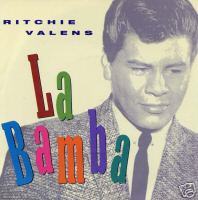A few weeks ago, we wrote about the Singing Nun, who had an unlikely #1 hit in the U.S. in 1963 with “Dominique,” a song sung in French. Here are some more non-English tunes that topped the American pop chart.
 • A rock version of the folk song “La Bamba” is Ritchie Valens’ best-known and signature song, but upon its release in 1959, it was only a minor hit. As the B-side of the #2-hit ballad “Donna,” “La Bamba” hit #23. But when a movie about Ritchie Valens life and untimely death (he died in the same plane crash that killed Buddy Holly and the Big Bopper) called La Bamba was released in 1987, a cover version by the band Los Lobos hit #1. It’s the first and only time a song sung entirely in Spanish has topped the charts.
• A rock version of the folk song “La Bamba” is Ritchie Valens’ best-known and signature song, but upon its release in 1959, it was only a minor hit. As the B-side of the #2-hit ballad “Donna,” “La Bamba” hit #23. But when a movie about Ritchie Valens life and untimely death (he died in the same plane crash that killed Buddy Holly and the Big Bopper) called La Bamba was released in 1987, a cover version by the band Los Lobos hit #1. It’s the first and only time a song sung entirely in Spanish has topped the charts.
• Only four non-English songs have ever become #1 hits in the United States. In addition to the previously mentioned “La Bamba” and “Dominique,” the other two are “Volare” by Domenico Modugno, an Italian-language hit in 1958, and “Sukiyaki,” by Japanese singer Kyu Sakamoto in 1963.
• Two songs partially sung in English have reached #1. Falco’s 1986 hit “Rock Me Amadeus” has German and English portions. Los Del Rio’s “Macarena” (1996) has English and Spanish sections.
• The first song performed in Korean to be a hit in the U.S.: “Gangnam Style.” The song by South Korean rapper Psy, fueled by a silly viral video, made it to #2 in 2012.
• “99 Luftballons” was a Cold War protest song released in 1983 by Nena, a New Wave band from Germany. It’s about a nuclear war breaking out, after floating balloons are misinterpreted as enemy aircraft. The song’s fears resonated, because even though it was performed in German, it was a huge hit in several non-German-speaking countries, including Sweden (#1), Switzerland (#1), Australia (#1), Spain (#10), and the U.S. (#2). Nena re-recorded the song in English as “99 Red Balloons” for the English-speaking market, but American record-buyers preferred the German version.
• Beatles bonus. The Beatles honed their skills playing nightclubs in Hamburg, Germany. Once Beatlemania struck in 1964, a German division of their record label, EMI, convinced the band to re-record a few of their biggest hits in German. Result: a double-sided single featuring “Komm, gib mir deine Hand” and “Sie liebt dich”—German versions of “I Want to Hold Your Hand” and “She Loves You,” respectively. The singles didn’t make it to the American pop charts…but they did make the top 10 in Germany.







